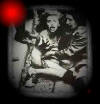|
Anne Frank
 June 12, 1929, marks the birthday of an extraordinary young
writer. Born of Jewish parents, Otto and Edith, Anne Frank received a diary as a
birthday present on her thirteenth birthday, 1942, and she immediately
began writing in it. At the time, she was living with her family in
Amsterdam, where they had moved to get away from the Nazi advanceóbut the Nazis
followed after them. From 1940, Anne had been living under Nazi occupation,
although her life was still fairly ordinary. Her earliest journal
entries talk about her grades and her classmates and the boys that she knew
from school. June 12, 1929, marks the birthday of an extraordinary young
writer. Born of Jewish parents, Otto and Edith, Anne Frank received a diary as a
birthday present on her thirteenth birthday, 1942, and she immediately
began writing in it. At the time, she was living with her family in
Amsterdam, where they had moved to get away from the Nazi advanceóbut the Nazis
followed after them. From 1940, Anne had been living under Nazi occupation,
although her life was still fairly ordinary. Her earliest journal
entries talk about her grades and her classmates and the boys that she knew
from school.
 In one early entry, she wrote that since she did not have any close friends,
she would treat her diary as though it were her friend, and she began
addressing it by the imaginary name of "Kitty." She wrote, "I hope I
shall be able to confide in you completely, as I have never been able to do
in anyone before, and I hope that you will be a great support and comfort to
me." Less than one month after writing those words, the Nazis began
deporting Jews to concentration camps, and Anne and her family went into
hiding in an attic above a store where they lived for the next two years. In one early entry, she wrote that since she did not have any close friends,
she would treat her diary as though it were her friend, and she began
addressing it by the imaginary name of "Kitty." She wrote, "I hope I
shall be able to confide in you completely, as I have never been able to do
in anyone before, and I hope that you will be a great support and comfort to
me." Less than one month after writing those words, the Nazis began
deporting Jews to concentration camps, and Anne and her family went into
hiding in an attic above a store where they lived for the next two years.
 The
family had prepared for that day since 1940, when Adolf Hitler and his
troops stormed into Holland and quickly imposed a series of curfews against
the Jews living there. He dictated where they could shop, swim, and go
to school as part of everyday Dutch life. Aware of where the
restrictions might eventually lead, Otto Frank spent a year preparing and
stocking an annex behind his business office at Prinsengracht 263, turning
it into a well-concealed hiding place adjacent to Otto's office. The
family had prepared for that day since 1940, when Adolf Hitler and his
troops stormed into Holland and quickly imposed a series of curfews against
the Jews living there. He dictated where they could shop, swim, and go
to school as part of everyday Dutch life. Aware of where the
restrictions might eventually lead, Otto Frank spent a year preparing and
stocking an annex behind his business office at Prinsengracht 263, turning
it into a well-concealed hiding place adjacent to Otto's office.
Eight people eventually lived in the secret annex, including the Frank
family, a family that Anne named in her diary Herman and Auguste van Pels and their son,
Peter, plus an elderly dentist she called Fritz Pfeffer--assumed names to
protect their innocence.
 Life
in the annex quickly settled into a monotonous routine. The residents
woke at 6:45 a.m. By 8:30, they all had to be quiet as the workers
showed up in the warehouse beneath them. Breakfast came at nine, and
afterwards, the stowaways stopped all unnecessary movement until 12:30 when the
warehouse closed for lunch. Life
in the annex quickly settled into a monotonous routine. The residents
woke at 6:45 a.m. By 8:30, they all had to be quiet as the workers
showed up in the warehouse beneath them. Breakfast came at nine, and
afterwards, the stowaways stopped all unnecessary movement until 12:30 when the
warehouse closed for lunch.
The refugees also ate lunch then while listening to news
of the war on the BBC. At 2 p.m., the warehouse reopened, and the group
fell silent again. Between 2 and 5:30, they spent their time
resting or reading. Once the warehouse closed for the day, everyone was free to move around. Bedtime was at
9 p.m.
Inevitably, emotions in the closed quarters ran high. The van Pels
tried unsuccessfully to discipline Anne, and, according to one source, Edith
Frank became chronically depressed.
 During
the group's quiet periods, Anne wrote in her diary
not only about the Nazi persecution and the experience of living in secret
but also about the day-to-day details of her adolescent life. She
wrote about how much she hated potatoes and how her older sister was clearly
her parents' favorite. She described the jokes people made and her
brief romantic flirt with Peter, the son of the other family living in the attic. During
the group's quiet periods, Anne wrote in her diary
not only about the Nazi persecution and the experience of living in secret
but also about the day-to-day details of her adolescent life. She
wrote about how much she hated potatoes and how her older sister was clearly
her parents' favorite. She described the jokes people made and her
brief romantic flirt with Peter, the son of the other family living in the attic.
More than anything, she wrote about her struggle to be an individual despite
her lack of privacy. "Everyone thinks I'm showing off when I talk,
ridiculous when I'm silent, insolent when I answer, cunning when I have a
good idea, lazy when I'm tired, selfish when I eat one bit more than I
should, stupid, cowardly, calculating....I really am trying to be helpful,
friendly, and good, and to do everything I can so that the rain of rebukes
dies down to a light summer drizzle."
In 1944, she heard on the radio that people should retain their war letters
and diaries because they would become historical documents someday.
She began thinking about trying to publish her diary or to turn it into a novel.
 But
on August 4, 1944, the annex was discovered and raided by Nazi police, and Anne and her
family were among the last Jews shipped out of the Netherlands to
concentration camps. Originally, they were held at Westerbork before
being shuttled to the infamous Auschwitz, where most were killed. Anne died of typhus in Belsen-Belsen six weeks before
the camp was liberated by the Allies. But
on August 4, 1944, the annex was discovered and raided by Nazi police, and Anne and her
family were among the last Jews shipped out of the Netherlands to
concentration camps. Originally, they were held at Westerbork before
being shuttled to the infamous Auschwitz, where most were killed. Anne died of typhus in Belsen-Belsen six weeks before
the camp was liberated by the Allies.
Her father was the only member of the family who survived. He traveled
back to Amsterdam to find that his secretary had saved Anne's diary.
He took several weeks to read it, because he could only bear to read a
little at a time without breaking down. He made copies for family
members before a Dutch university professor who read the diary
urged Frank to publish it.
 Anne Frank: The Diary of a Young Girl
was published in 1947, and
it was an immediate bestseller. It was translated into more than 50
languages. The entire first printing of the English translation sold
out the day after it was reviewed in the New York Times. It
was made into a play and then into a movie, and it has since become the standard book used
in schools for introducing children to the Holocaust. To
date, it has sold over 25 million copies. Anne Frank: The Diary of a Young Girl
was published in 1947, and
it was an immediate bestseller. It was translated into more than 50
languages. The entire first printing of the English translation sold
out the day after it was reviewed in the New York Times. It
was made into a play and then into a movie, and it has since become the standard book used
in schools for introducing children to the Holocaust. To
date, it has sold over 25 million copies.
 Discover Anne Frank
at Amazon.com
Indulge
Yourself - Check Out Today's Best-Selling
Fiction -
Nonfiction -
DVDs |





 During
the group's quiet periods, Anne wrote in her diary
not only about the Nazi persecution and the experience of living in secret
but also about the day-to-day details of her adolescent life. She
wrote about how much she hated potatoes and how her older sister was clearly
her parents' favorite. She described the jokes people made and her
brief romantic flirt with Peter, the son of the other family living in the attic.
During
the group's quiet periods, Anne wrote in her diary
not only about the Nazi persecution and the experience of living in secret
but also about the day-to-day details of her adolescent life. She
wrote about how much she hated potatoes and how her older sister was clearly
her parents' favorite. She described the jokes people made and her
brief romantic flirt with Peter, the son of the other family living in the attic.

